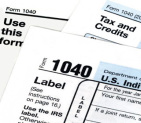
What is an Enrolled Agent?
Enrolled Agents (EAs) are America’s tax experts. They are the only federally-licensed tax practitioners who both specialize in taxation and have unlimited rights to represent taxpayers before the Internal Revenue Service. These tax specialists have earned the privilege of representing taxpayers before the IRS by passing a comprehensive three-part examination covering individual tax returns; business tax returns; and, representation, practice and procedure. All candidates are subjected to a rigorous background check conducted by the IRS
What are the differences between enrolled agents and other tax professionals?
The enrolled agent license is the most expansive license the IRS grants a tax professional. Enrolled agents are generally unrestricted as to which taxpayers they can represent, what types of tax matters they can handle, and the IRS offices before which they may practice. Unlike attorneys and CPAs, who may or may not choose to specialize in taxes, all enrolled agents specialize in taxation. CPAs and attorneys are licensed by the states, but enrolled agents are federally licensed. While the IRS requires all preparers to obtain and maintain a valid Preparer Tax Identification Number (PTIN), enrolled agents have gone beyond the basic requirements and have demonstrated their expertise through testing.
The enrolled agent license is the highest credential the IRS issues.
The advantage of working with an enrolled agent lies not only in the depth of his or her experience and understanding of how to prepare a tax return, but in his or her knowledge of tax law that may be used to represent taxpayers before the IRS. If you get a letter from the IRS, or worse, are audited or are the target of a collection action, your EA can speak directly to the IRS on your behalf.
Why should I choose an enrolled agent who is a member of the National Association of Enrolled Agents (NAEA)?
The IRS recommends using a tax preparer that is a member of a professional organization that offers continuing education and other resources, and holds members to a code of ethics. NAEA goes beyond the IRS’ recommendations by requiring members to fulfill continuing education requirements that exceed the IRS’ required minimum. In addition, NAEA members must adhere to a stringent Code of Ethics and Rules of Professional Conduct. Members of NAEA belong to a strong network of experienced, well-trained tax professionals who effectively represent their clients and work to make the tax code fair and reasonably enforced.
Are enrolled agents required to take continuing professional education?
In addition to the stringent testing and application process, the IRS requires enrolled agents to complete 72 hours of continuing education every three years to maintain their licenses. NAEA raises the bar even further—its members are required to complete at least 90 hours in a three-year period.

